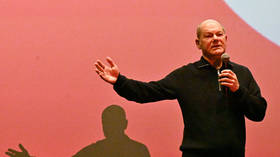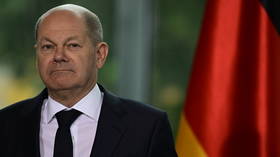Scholz explains why he will keep talking to Putin

German Chancellor Olaf Scholz says he will keep talking to Russian President Vladimir Putin because he wants to find a solution to the conflict in Ukraine. This will not happen if the sides stop talking to each other, the chancellor said at a press conference in Potsdam, Germany on Saturday.
“I’ll keep talking to him,” Scholz said. “I want to live to see the moment when it is possible to get out of the situation,” he told the audience, adding that “you can’t do that if you do not talk to each other.”
Scholz also praised Putin’s good command of German and said the Russian leader has always remained polite during their conversations. He also claimed that Putin’s position has changed in many ways since Russia launched its military operation Ukraine in late February. Nevertheless, the chancellor accused Moscow of wishing to “conquer a part of Ukraine’s territory by force.”
His comments come just over a week after his last phone call with Putin on December 2. According to the Kremlin, Putin and Scholz discussed “different aspects of the situation in Ukraine,” and the Russian president explained Moscow’s position in detail. Putin also spoke about the “destructive” policies of Western nations that continue to pump Ukraine full of arms. This, along with their financial support, has led to Kiev rejecting the idea of talks, according to the Russian leader.
Scholz “condemned the Russian airstrikes” against what he called “civilian infrastructure in Ukraine,” and “underscored Germany’s determination to support Ukraine” by ensuring it has the capabilities to defend itself against what the chancellor called “Russian aggression.”
In October, Scholz told Deutschlandfunk radio that the tone of his conversations with Putin “is always friendly, even if we have very different views on the matter,” while warning that no one should “harbor any illusions” that this will bring swift results.
That same month, the chancellor dismissed reports that Putin was threatening to escalate the conflict. “The reports that I read about the alleged threats during these negotiations are false,” he said.














